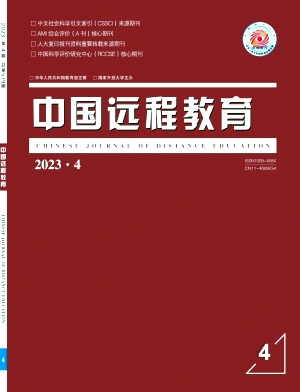
Contents
• The Historical Logic, Internal Quality and Future Direction of Chinese-style Modernization of Education: High-quality Development of Education Supporting Chinese-style Modernization
• ChatGPT-like Products: Internal Mechanism and its Impact on Learning Evaluation
• ChatGPT Boosting Digital Transformation of Education in Schooling:What to Learn and How to Teach in the Era of Artificial Intelligence
• Educational Application and Prospect of Generative Artificial Intelligence: Taking ChatGPT System as An Example
• Will Large Language Model Lead to Structural Changes in Schools?: Prospective Analysis Based on ChatGPT
• The Second Chance: Characteristics and Mechanism of the Influence of Internet Learning on Class Acquisition
• The Structural Contradiction and System Construction of the Growth of Undergraduate Education Organizations
• Research on Cognitive Engagement Intervention Strategies for Autonomous Learning Stage of Blended Teaching
• How to Avoid the Global Education Crisis through Educational Transformation?: A Review of the Vision of the United Nations Transforming Education Summit
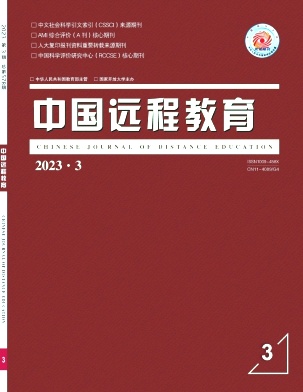
Contents
• Training Policies for Primary and Secondary School Teachers Since the Founding of New China: Historical Stages, Development Characteristics and Improvement Strategies
• The Essential Characteristics and General Process of Human-Machine Collaborative Learning in the Age of Artificial Intelligence
• Rethinking the Essential Connotation of Lifelong Education from the Perspective of Reconstruction of the Relationship between Man and the World
• Connotation Discrimination and Evaluation Framework Construction of High School Students’Media Literacy in New Era
• Study on Elderly-oriented Evaluation and Influencing Factors of Elderly Learning Websites under Lifelong Learning: An Analysis Based on the Topsis-Dematel Model
• Digital Generation Gap in Digital Transformation of Education: the Education Mirror of Digital Feedback
• Research on Educational Informatization Promoting Rural Teacher Team Construction: Based on a Large-Scale Survey in X Province in Western China
• Development of School Principal Technology Leadership Scale Based on the New Infrastructure of Education
• The Development Stage and Internal Logic of Information Technology Supporting Classroom Teaching Reform in China
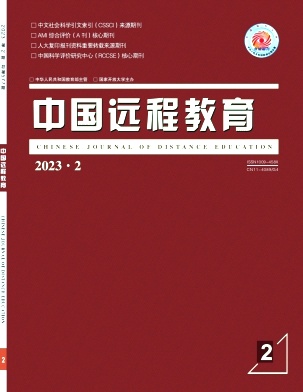
Contents
• The Integration and Innovation of Artificial Intelligence and Education:Ethical Connotation and Realization Path
• Low-skilled Workers: Connotation,Group Characteristics and Skill Enhancement Strategies
• Intelligent Technology Empowers Basic Education Evaluation Reform: the Practical Dilemma and Path Choice
• Assessing Scientific Inquiry Process with Computer Simulation: Trend and Practical Implications
• An Empirical Study of the Effect of Distance Higher Education on Economic Growth in China
• Research on the Construction of Smart Classroom Structure Model from the Perspective of“Function-Structure”Relationship
• Research on the Influencing Factors of the Innovation Diffusion of Artificial Intelligence in Education Based on TOE Theoretical Framework
• How Different Roads Lead to the Same Goal? Analysis of the Practical Effect of Blended Teaching with Different Complexities
• Building an Elderly Education Service System in the New Era:Value Orientation and Practical Approach
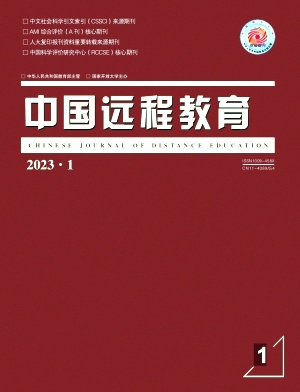
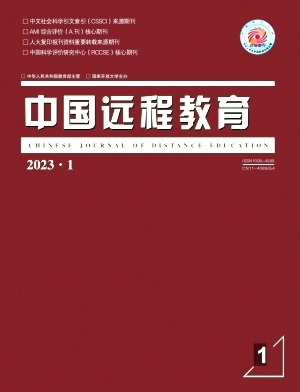
Contents
• Research of Chinese Experience on Fighting against COVID-19 in Education Field: from the Perspective of Online Education
• Chinese-style Modernization of Education: Essential Features, Challenges and Pathways
• The Logical Basis and Practical Path of Implementing Elite Education in the Universal Stage of Higher Education
• On the Values and Realization of the Basic Education Teachers Enhancement Program
• The Internalist Ethics of Technology: Considerations for the Intelligent Transformation of Teaching Evaluation
• Research on the Path of Resilient Instruction Ecology in Colleges Empowered by Artificial Intelligence
• Construction and Application of Teacher Training Five-Domain Evaluation Framework:Taking 2022“National
• Summer Teacher Training”as An Example
• Vocational Education in New Law of Vocational Education
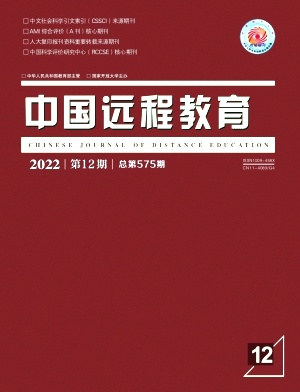
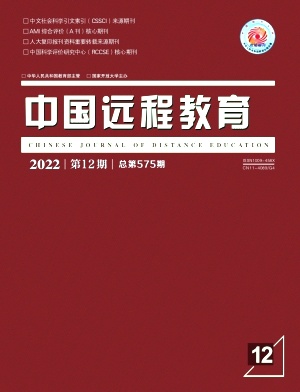
Contents
• Key research projects in education sciences in China in the 21st century: progress, trends and reflections
• A review of intercultural education
• Ethics of responsibility: posthuman objective of moral education in the information age
• Digital technology-enabled co-governance of rural and urban compulsory education: theoretical mechanism and realization pathways
• “Tenured migrant workers”: analyzing the viability of educational development at the county level from micro behaviors of would-be teachers for rural schools
• Towards a value-added assessment mode supported by intelligent technology
• Assessing critical thinking about real-world problems: status quo and challenges
• Educational assessment in the era of artificial intelligence: towards a universal theoretical framework and practice pathways
• Contents of Chinese Journal of Distance Education in 2022
、
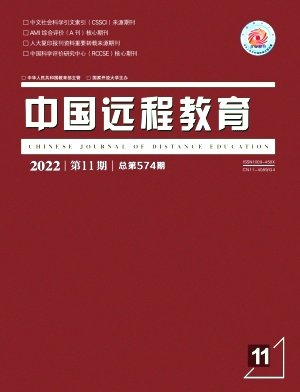
Contents
• Taking advantage of digital transformation affordances to construct the new ecology of smart education
• Different understandings and new interpretation of smart instruction
• The growth patterns and education pathways of contemporary university students
• The innovation and reform of education for the high-quality development of economy
• Towards a"four-dimension-In-one"community model of ideological and political education: the case of the Open University of China
• How to benchmark the quality of degree/diploma programmes in continuing education: historical debates and contemporary demands
• A survey of primary school science teachers’teaching practice and its influencing mechanism in 31 provinces in China
• Deep learning from the perspective of knowledge: connotation, barrier and pathway
• The impact of stratified teaching on vocational school students’ academic achievement : a meta-analysis of 42 Chinese experimental studies
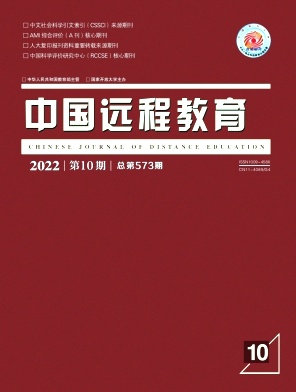
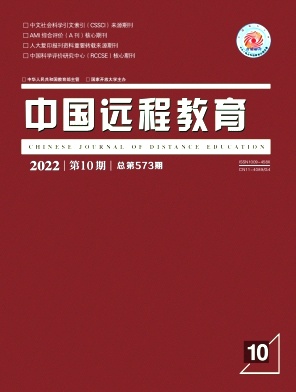
Contents
• Reflections on the view of knowledge in the Age of Artificial Intelligence
• Major findings and trends of digital intelligent decision making-oriented learning analytics research: a qualitative meta analysis of articles presented to LAK conferences (2011-2021)
• How can teachers survive in the age of artificial intelligence? A critical reflection
• Research trajectory of continuing education quality assurance in China: a visualization of CNKI literature
• External factors influencing the scale of open education enrollment
• Toward a future of co-learning and mutual learning: a knowledge map of contemporary intergenerational learning research
• Intergenerational learning: towards a framework of theoretical analysis
• A study of middle school students' behavioural characteristics and learning outcomes in online after-school services
• Abstracts
• Contents
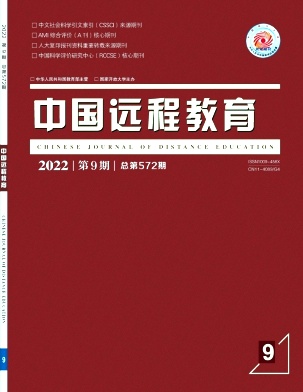
Contents
• Online teaching competence enhancement: understanding open university teachers' perception from the perspective of structuration theory
• Facilitating active aging in the new era: setting standards for constructing open universities for the elderly
• Multimodal data-enhanced research in education sciences: development trajectory and challenges
• STEM education: dilemma and reflection
• Core elements, problems and prospects of student innovation ability: a systematic review of publications in core Chinese journals
• Analyzing teaching characteristics and interaction patterns of STEM classroom from the perspective of multi-dimensional evaluation
• Performance assessment of STEM teachers' teaching competence: model construction and verification
• Towards constructing a social interaction network highlighting both quantity and quality: methodological innovation and verification
• Privacy protection for educational apps: evaluation indicator construction and the status quo in China
• Abstracts
• Contents